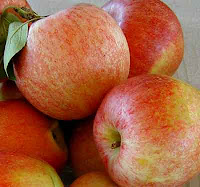Food Rules 
#27- "Eat animals that have themselves eaten well." Animals raised for food should eat what animals eat naturally. Like grass. Not other animals parts. They should not be given growth hormones or antibiotics to make them grow unusually fast and large.
Food Rules 
#30- "Eat well-grown food from healthy soil." Organic food is usually grown well and pesticides and chemical fertilizers are avoided. But all organic food is not necessarily healthy. I don't think organic Oreos are any better for your diet than the regular ones!
When I am picking food either at the grocery store or at the farmer's market, I try to buy locally grown, in-season produce whenever possible. Here is a list of the
"dirty dozen" and "clean 15" fruits and vegetables. I like to try to follow this list when I can- although organic produce is more expensive. Generally fruits and vegetables you eat whole like apples and peaches are the most "dirty", and those you peel like corn or watermelon are the "cleanest". The
latest study has a shown a link between pesticide exposure and ADHD in children.
Organic food is more expensive. I have read if you are going to start somewhere, start with organic eggs and milk. Laying hens on a commercial factory-farm are raised in terribly crowded indoor conditions. Even those marked "free-range" never go outside they are just kept in large indoor pens instead of cages. They are given hormones to speed their growth at an abnormal rate. Their beaks are clipped off to prevent them from pecking each other. Commercial milking cows also spend their whole lives in a stall in a huge barn. They don't go outside to graze. They stand in their own waste. Their calves are taken away from them and fed commercial feed. Only beef cows generally get to graze in a pasture. I am not a vegetarian, but I have a hard time eating commercially raised beef, chicken and pork except for locally farm grown or organic grass-fed. For more information see
Eating Animals 
by Jonathan Safran Foer,
Fast Food Nation 
by Eric Schlosser, or
Animal Factory 
by David Kirby.
Organic foods should also be free of GMO's or genetically modified organisms (aka- genetically engineered). Although because of cross-pollination some GMO's are finding their way into nearly all the food supply. Just about all soybeans grown in this country for food or for feed are GMO's. Right now I challenge you to look at any package of food you have from cookies, to salad dressing, to candy bars and you will see an ingredient called "soy lecithin" or "soybean oil" or just "lecithin". It's everywhere! For more on GMO's and soybeans see
The World According to Monsanto 
by Marie-Monique Robin or
Food Inc. DVD 
by Eric Shlosser and Michael Pollan.
There is a great
Eating Organic Series at this blog-
Your Green Helper. She also lists money-saving tips for buying organic, green and eco-friendly products.
Mambo Sprouts- great site for coupons for organic items.







